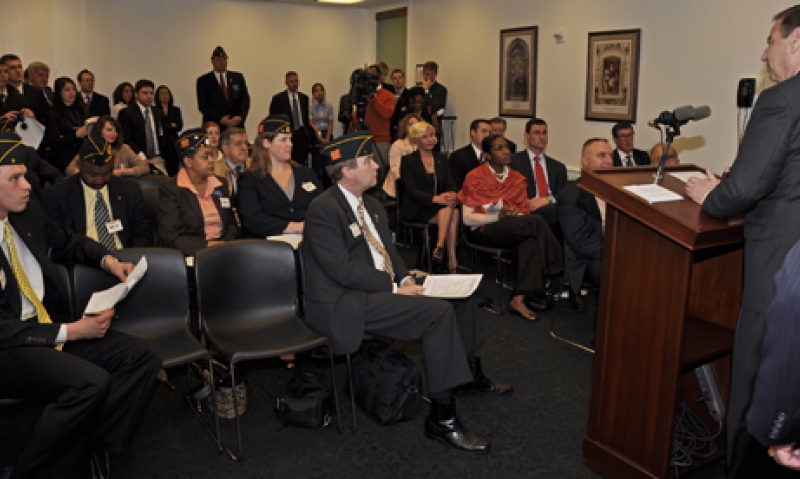
Female veterans, rural patients and caregiver families are pinpointed for relief in legislation guided by the Legion's priority list.
Several of The American Legion's top legislative priorities are wrapped up in S. 1963 - an omnibus bill passed Wednesday by the House of Representatives - that aims to improve women's services at VA health-care facilities, provide better support for caregivers of disabled veterans, expand mental-health services, reduce homelessness and commit the U.S. government to a number of other initiatives to better serve veterans and their families.
The Caregivers and Veterans Omnibus Health Services Act sailed through the House by a 419-0 vote. A Senate vote awaits. House Veterans Affairs Committee Chairman Bob Filner, D-Calif., said the cost estimate of the added services is about $1.7 billion over the next five years, or approximately 1 percent of the VA budget.
American Legion National Commander Clarence Hill testified before a joint session of the House and Senate Veterans' Affairs Committees last September that women's health-care needs had to move up on the congressional agenda for VA. "The demographic of the American veteran is changing," he told the committees at that time. "This includes a growing and significant number of women veterans who sacrifice no less than their male counterparts."
After S. 1963 passed Wednesday, American Legion Veterans Affairs & Rehabilitation Division Director Barry Searle said the nation's largest veterans organization is "especially impressed by the attention this bill is giving to our 1.8 million women veterans. It specifically calls for VA mental-health professionals to be educated and trained to handle sexual trauma cases. It authorizes a study to find out what barriers are preventing women veterans from seeking the VA health-care benefits they've earned from their service. The bill creates a pilot program to provide childcare services for mothers who need VA services, and even provides seven days of health care to newborn children of women veterans."
Hill added that the Legion has worked closely with Congress over the last year and a half to set fresh, relevant priorities for VA health care and pass legislation that will make them a reality. "This omnibus bill really strengthens the quality and quantity of health care for our nation's veterans," Hill explained. "It improves VA rural health care and increases access to mental health care. It even gives more care and services to veterans who've been exposed to Agent Orange and other chemicals in combat zones. This bill is a comprehensive response to many things The American Legion has been advocating for quite some time."
The Legion has worked for several years to improve VA access in rural areas. In many sparsely populated parts of the country, veterans are forced to drive hundreds of miles to receive medical care. Until recent years, their travel reimbursement was 11 cents a mile. While the reimbursement rate has more than quadrupled in response to pressure from The American Legion, the omnibus bill passed Wednesday is designed to do a better job of delivering care where veterans live.
"This bill will do a lot for our veterans living in rural and other remote areas," Searle explained. "It requires VA to focus on recruiting and retaining more health-care workers in rural areas, improve the overall quality of health care in rural communities, and to expand telemedicine services in those areas."
Commander Hill has also spoken with leaders in Congress and the administration to extend help for families who struggle to take care of their wounded-warrior or disabled-veteran spouses or children. "This legislation will support family members and others who care for the disabled, ill, or injured veterans," Speaker of the House Nancy Pelosi, D-Calif., said, "This is very important to families, military families. Our wounded soldiers and their families have made a serious sacrifice for our country, and this bill will bring them some relief." The measure offers 24-hour respite care in veterans' homes, caregiver training and mental health counseling, as well as financial support to cover travel costs for medical treatment.
Filner and Pelosi both praised The American Legion for its persistence, insight and support as the bill was crafted. "As the leaders of The American Legion have stated, this legislation offers bold solutions to major challenges facing servicemembers, veterans and their families."
Other provisions of the bill include:
- Prohibition of co-payments for veterans who are catastrophically disabled.
- More locations where homeless veterans can receive help.
- Authorization for a long-awaited study on military and veteran suicide and a requirement for VA to provide counseling referrals for members of the armed forces who are not otherwise eligible for readjustment counseling.
- Plans for a pilot program studying the use of community organizations and local and state government in providing care and benefits to veterans.
- A requirement for VA to contract with the Institute of Medicine to study the health impact of Project Shipboard Hazard and Defense.
- A pilot program to provide specified dental services to veterans, survivors, and dependents of veterans through a dental insurer.
- A requirement for VA to provide hospital care, medical services, and nursing home care for certain Vietnam veterans exposed to herbicide and Gulf War-era veterans who have insufficient medical evidence to establish a service-connected disability.
"It is simply our duty as a nation, when we put our men and women in harm's way, to care for them when they return," Filner said. "S. 1963 demonstrates America's commitment to the dedicated servicemembers who have served in uniform and puts front and center the health-care needs of veterans and their families. It is our pledge to them, that we have not forgotten the sacrifices they have made in defense of this country."
- Legislative

